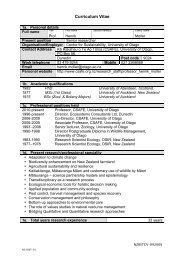Mana moana, mana tangata Testimonies on depletion and ...
Mana moana, mana tangata Testimonies on depletion and ...
Mana moana, mana tangata Testimonies on depletion and ...
You also want an ePaper? Increase the reach of your titles
YUMPU automatically turns print PDFs into web optimized ePapers that Google loves.
like stuff you could get out in the ocean you could get in the estuary there was that good <strong>and</strong> that<br />
changed in 1958 when the government at the time subsidised farmers to drain their l<strong>and</strong>s <strong>and</strong> as a<br />
c<strong>on</strong>sequence the Kaituna River was diverted before it got to the estuary <strong>and</strong> so as a c<strong>on</strong>sequence I think<br />
we've <strong>on</strong>ly got now pipis left in our estuary, flounder, bit of pātiki, but that's it ... with the trying to drain<br />
l<strong>and</strong>s around here because this was a huge raupō area, ... there's all this pressure from farmers to get<br />
some drainage going so they could use the l<strong>and</strong> for dairying, whatever <strong>and</strong> that sort of happened late<br />
1950s. There'd been a big flood <strong>and</strong> so the government helped secure funding to divert the river ... the<br />
Ministry of Works was involved, drainage boards <strong>and</strong> that <strong>and</strong> the engineer said, ‘D<strong>on</strong>’t do it. It's not<br />
going to work,’ <strong>and</strong> the Ministry of Works, I think, refused to listen <strong>and</strong> did it <strong>and</strong> it didn't stop the<br />
flooding, but they put in the thing <strong>and</strong> then the groyne so it couldn't close again because they used to<br />
deal with it all the time to close up, nature used to close it <strong>and</strong> that's just how it happens here, put<br />
groynes in to keep it open here. The thing is that it never cured the flooding so that damage was d<strong>on</strong>e<br />
<strong>and</strong> since that time, really, it's just been, the Kaituna River has just been looked at as a big drain. ... Wai<br />
4 which was the claim for the Kaituna, Waitangi Tribunal claim <strong>and</strong> that happened when (?) Rotorua<br />
District Council were going to put their sewerage in because the Kaituna actually comes from (?) from<br />
Lake Rotoiti it starts <strong>and</strong> of course the Rotorua District Council at the time were going to put their<br />
sewage raw into pipes <strong>and</strong> then divert it down to the Kaituna River. ...It didn't matter the damage it had<br />
d<strong>on</strong>e, river’s just silted up since, or the estuary has. I think that for all of us in Maketu, the estuary was<br />
why we were here. It's quite emoti<strong>on</strong>al actually, so the estuary, the families that were st<strong>and</strong>ing by the<br />
estuary, it was just our culture really, <strong>and</strong> the estuary was why we were here. – Interviewee #15<br />
.....................<br />
When I first came out to Waihou with my [X] I was 16, watercress was all up <strong>and</strong> down the river. We<br />
could go there now <strong>and</strong> you could hardly find any, you know, it’s a good 25 years later. So you know,<br />
the obvious <strong>on</strong>es, the sedimentati<strong>on</strong>, (?) nutrient loading from the surrounding farml<strong>and</strong>s, all of those<br />
things that have impacted <strong>on</strong> our waterways, but really the probably biggest significant influence <strong>on</strong><br />
that has been the local authorities <strong>and</strong> I guess, the disc<strong>on</strong>necti<strong>on</strong> between the iwi <strong>and</strong> the local<br />
authorities historically in that there were no dialogue between them to, for us to share the loss of those<br />
resources <strong>and</strong> also, I guess, they had no taringa at the time to hear any of the kōrero so thankfully that’s<br />
starting to change but yeah, that’s a huge questi<strong>on</strong>. I think it boils down to the loss of rangatiratanga<br />
over the ability to c<strong>on</strong>trol the l<strong>and</strong> <strong>and</strong> what it was used for which has created the situati<strong>on</strong> we have<br />
now. – Interviewee #18<br />
.....................<br />
You got to be so careful, like <strong>on</strong>e time they had a c<strong>on</strong>tract digging the pipeline, well they were supposed<br />
to go underground across the pipi bed at (Rowaihi?) to (Pukehina?) to this water main, but they’re<br />
supposed to go underground. Apparently he ran into trouble <strong>and</strong> so he used a bloody digger, going in at<br />
low tide <strong>and</strong> digging up this trench <strong>and</strong> these people ring me up from (Rowaihi?) says, ‘Jesus<br />
[Interviewee #19], you better get down here!’ So I got down there <strong>and</strong> I thought, ‘Oh Christ,’ <strong>and</strong> I<br />
stopped the c<strong>on</strong>tract work. I stopped the c<strong>on</strong>tract work. I said, ‘Listen, we’re going to have to talk<br />
about this because you’re going over pipi beds <strong>and</strong> stuff,’ <strong>and</strong> he said, ‘Oh I d<strong>on</strong>’t think there’s any pipi<br />
beds here. ...,’ I said that’s by-the-by, they move.’ I said they move so we closed the whole operati<strong>on</strong><br />
23



